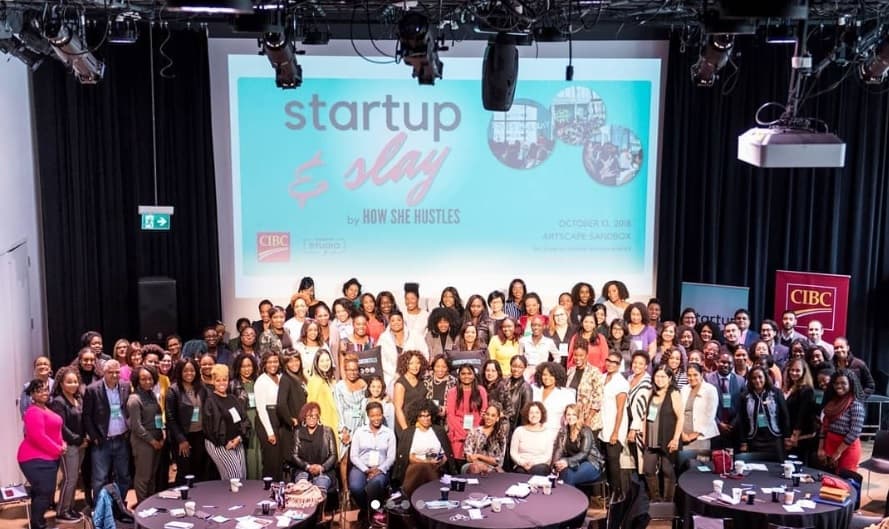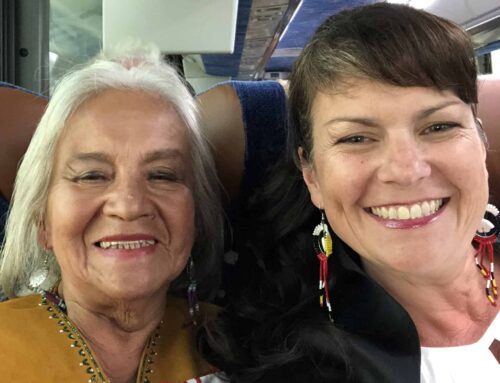Did you know it’s Small Business Week in Canada?
Small businesses have 1-99 employees. The majority of small businesses in our country are actually ‘micro-enterprises’ of 1-4 people. About 16 per cent of small businesses are majority-owned by women, and there were about 950,000 self-employed women in Canada in 2012.
That said, current statistics are not readily available about Women of Colour who are entrepreneurs or small business owners. We do know that approximately 51 per cent of Indigenous-owned small and medium businesses in Canada belong partly or wholly to women. And data from 2001 showed that 19 per cent of visible minority entrepreneurs are women. But it seems not much else is out there, and often the support and opportunities that Women of Colour need to start their businesses aren’t out there either.
How She Hustles, a diverse women’s network, is aiming to change that. They held an event for diverse women entrepreneurs that I attended this month called Start Up and Slay. Here are a few things I learned that I hope will help everyone better support women entrepreneurs of colour:
BUILDING A BUSINESS WITH CONFIDENCE: Although resources to get started as an entrepreneur are available, not everyone accesses them in the same way:
- Saadia Muzaffar (TechGirls Canada) says it’s imperative to get clear on the problem that your business is trying to solve before accessing services. Being a racialized woman, she says it’s especially important to “separate noise from signal” and get clarity on what you want to do. Women of Colour often feel they can’t control many external factors, so she says what they can control is the inner work to define the exact problem their business aims to solve.
- Saadia says that Women of Colour are told not to overestimate their abilities. In fact, they’re often trained to underestimate them. Right from the start, women entrepreneurs of colour must have the gumption to say “I belong here and I deserve to succeed.”
- Michelle Lochan (Ministry of Innovation, Science & Economic Development) says diverse women should always make sure they mention their diverse perspectives (as both women and as people of Colour, and also from any other intersecting identities that are central to who they are) in their work. She also says it’s key to connect with organizations that focus on getting diverse businesses amplified, like WEConnect. (Michelle went through the MicroSkills program, which was a Canadian Women’s Foundation-funded program. She also now sits on our Foundation’s Economic Development Committee. Read more about her story here.
- Lauren Robinson (Female Funders) says avoid the temptation to ask for money straight away when talking to a potential investor. Instead, tell them your story: Investors are more likely to invest in people they believe in, and telling your story makes that connection.
NETWORKING: When Women of Colour are expanding their networks beyond their immediate circles, it can sometimes mean entering spaces in person and online that don’t feel inclusive:
- Saadia says she initially wasn’t sure if she belonged in all the rooms she entered. But she always entered those rooms from a place of knowing that she is smart and resourceful and she has value to offer.
- Saadia also mentions that social networking has been key to her success – Twitter, in particular, allows her to find like-minded folks to connect with and learn from.
- Michelle says not to worry about who is in the room. Think rather about the door that the room is opening up to you. Look at that door and put your focus on opening that up instead of getting overly concerned with who is in the room.
- Saadia says trust is everything when it comes to networking and sharing contacts. Regarding her social networks, like her LinkedIn contacts, she says those contacts are not just there for her. There is no value in her “hoarding” those contacts. She wants to share them, and she encourages those who want an introduction to someone in her network to simply ask her for it. Opening doors for each other in this way is an important practice for all women – entrepreneurs or not – to lift up other women in their lives, but it is especially helpful to those who are getting a new venture off the ground.
Learn More:
- Read the facts about women’s leadership in Canada
- Read our blog post about how to nurture leadership in kids
Take Action:
- Sign up for our e-newsletter to have our latest stories and resources sent to your inbox
- Follow us on Facebook and Twitter to join a national conversation about women’s leadership







